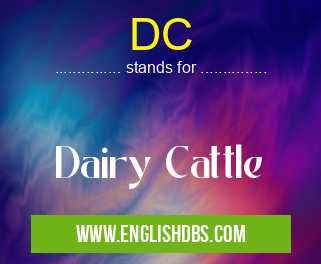What does DC mean in FARMING & AGRICULTURE
DC stands for Dairy Cattle, which refers to domesticated bovine animals raised specifically for milk and dairy products production. They are bred and managed to maximize milk yield and quality. Dairy cattle are essential in the agricultural industry, providing nutritional sustenance to humans worldwide.

DC meaning in Farming & Agriculture in Miscellaneous
DC mostly used in an acronym Farming & Agriculture in Category Miscellaneous that means Dairy Cattle
Shorthand: DC,
Full Form: Dairy Cattle
For more information of "Dairy Cattle", see the section below.
Characteristics of Dairy Cattle
- High milk production: Dairy cows are bred to produce large volumes of milk with desirable fat and protein content.
- Lactation period: Cows typically have a lactation period of around 300 days, during which they produce milk.
- Specific breeds: Common dairy cattle breeds include Holstein, Jersey, Brown Swiss, and Ayrshire, each with unique characteristics and milk-producing qualities.
- Feeding and management: Dairy cattle require specialized diets, including high-quality feed and supplements, to support their lactation performance. They also need proper housing, ventilation, and veterinary care.
Importance of Dairy Cattle
- Milk and dairy products: Dairy cows provide milk, a staple food rich in calcium, protein, and other essential nutrients. They also produce other dairy products such as cheese, butter, and yogurt.
- Economic value: The dairy industry generates substantial economic revenue through the sale of milk and dairy products.
- Nutritional security: Dairy products are important sources of nutrients for a growing population, contributing to global food security.
Essential Questions and Answers on Dairy Cattle in "MISCELLANEOUS»FARM"
What are the characteristics of dairy cattle?
Dairy cattle, specifically breeds of cattle, are renowned for their exceptional milk production capabilities. They possess distinct physical attributes that contribute to their dairy prowess, including well-developed mammary glands, spacious udders, and prominent milk veins. Their body structure is optimized for efficient digestion and nutrient utilization, allowing them to convert feed into high-quality milk.
What are the major dairy cattle breeds?
Among the numerous dairy cattle breeds worldwide, certain breeds stand out for their exceptional milk production traits. Holstein-Friesian, Jersey, Ayrshire, and Brown Swiss are prominent examples. Each breed exhibits unique characteristics, such as milk yield, butterfat content, and adaptability to different environments.
How is milk production managed in dairy cattle?
Dairy cattle farming involves meticulous management practices to optimize milk production. Proper nutrition, including balanced rations tailored to the nutritional requirements of lactating cows, plays a crucial role. Advanced technologies, such as milking machines and automated feeding systems, are employed to enhance efficiency and hygiene. Veterinary care and disease prevention are essential to maintain herd health and milk quality.
What are the ethical considerations in dairy cattle farming?
Ethical considerations are paramount in modern dairy cattle farming practices. Animal welfare is prioritized, ensuring that cows receive proper nutrition, housing, and veterinary care. Responsible farmers adhere to industry best practices and regulations to minimize stress and promote the well-being of their animals throughout their productive lives.
How does dairy cattle farming contribute to the food supply chain?
Dairy cattle farming plays a vital role in the global food supply chain by providing a significant portion of the world's milk and dairy products. Milk is a nutrient-rich beverage consumed by people of all ages, providing essential vitamins, minerals, and protein. Dairy products, such as cheese, yogurt, and butter, are versatile ingredients used in various culinary preparations.
Final Words: Dairy cattle (DC) are integral to the production of milk and dairy products, providing crucial nutritional value and economic benefits. Understanding their characteristics and importance highlights the significance of these animals in the agricultural sector and the role they play in nourishing communities worldwide.
DC also stands for: |
|
| All stands for DC |
